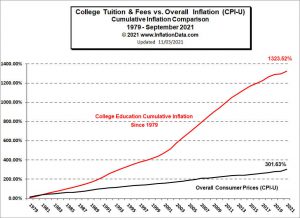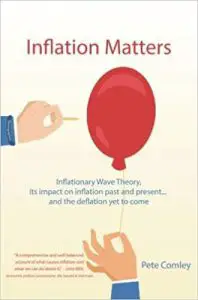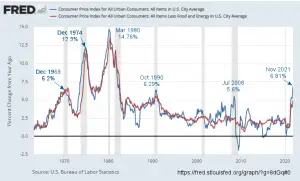While the pandemic began to alter the way we live in 2020, its ripple effect on the economy has continued the devastation. Initially, people were not spending as much as they would have if they didn’t have to remain at home. Once the government relaxed the restrictions in November 2020, people began traveling and satisfying their pent-up demand. This surge in spending overwhelmed the limited supply, which caused short-term inflation (when demand exceeds supply, prices go up). Several other factors have affected inflation since then, and households have been reeling due to the hikes in the prices of everyday items. However, hardly anyone talks about the effect of inflation on American … [Read more...]
9 Inflation Books You Must Read
For the average person, deflation, inflation, and even hyperinflation may seem quite murky or mysterious. However, it's actually a lot easier than you'd think. With the right books, the idea of inflation can be broken down for you, and you can start to understand how monetary inflation works. You might also like: How the FED Controls the Money Supply Money Multiplier Velocity of Money Agflation- What is it? Inflation and Velocity of Money What is the Real Definition of Inflation? Here are 9 books that you have to check out if you want to understand more about inflation. 1) Inflation Matters by Pete Comley Inflation Matters is a truly comprehensive book … [Read more...]
The Biggest Commodity: The College Degree and Academic Inflation
The College Degree When we hear the term "valuable commodity" we might think about oil or gold. Yes, these are undoubtedly commodities (though their value has fluctuated over time), but many other less concrete objects are also considered commodities in our society today. A commodity is defined as "A raw material or primary agricultural product that can be bought and sold, such as copper or coffee." But the second definition is "a useful or valuable thing, such as water or time". Based on the second definition, one of the most valued commodities available in modern society is a college degree. While it may sound odd to refer to a diploma as a commodity, there's no denying that a college … [Read more...]
The US’s Education Bubble
By Doug Hornig and Alex Daley, Casey Research In the world of finance, there is always talk of bubbles – mortgage bubbles, tech stock bubbles, junk bond bubbles. But bubbles don’t develop only in financial markets. In recent years, there's been another one quietly inflating, not capturing the attention of most observers. It's an education bubble – just not the one of student debt that has graced the pages of the New York Times and so many other publications in recent months. The problem is not that we are overeducating ourselves as many would have you believe. Rather, it’s that we are spending a fortune to undereducate ourselves. The United States has always been a very educated … [Read more...]
How Does Inflation Affect You?
When people go the the grocery store and see ever higher prices they know how inflation affects them. But when they are feeling more philosophical they might reason that if all wages and prices increased at the same rate it would all balance out in the end right? Well theoretically yes but in reality it never works that way. Prices of various items all increase at different rates so some people are benefiting while others suffer. Those on fixed incomes suffer the most because the cost of things they are buying increases but their income stays the same. This is where COLA or "Cost Of Living Allowance" comes in it is an adjustment that is made to compensate for the increase in prices due … [Read more...]
Is a Stock Market Crash Inflationary or Deflationary?
Recently a subscriber asked me the question above, he gave quite correct arguments about how the stock market is "a zero sum game" in other words for every buyer there is a seller, so overall everything should stay in balance. But as I'm sure you know there are at least 3 ways to measure money supply M1, M2 and M3. Each one includes increasingly broad definitions. From just cash equivalents up to including all sorts of time deposits and Government debts. But what they don't include is stock valuations, however if the price of your stocks increases you feel richer and are more likely to spend money from your other accounts because you know if you need the money you can always sell your … [Read more...]
Credential Inflation: Bachelor’s Degree Not Enough
In today's tumultuous economic climate, when we hear the term "inflation" we think money and a failing economy our minds immediately turn to expenses, debt, and money woes. Rarely, however, do our minds turn to college degrees and job prospects. On July 22, 2011 Laura Pappano from The New York Times published an article titled The Master's as the New Bachelor's. Introducing into the public mindset the concept of "credential inflation" and "degree inflation", this article has caused quite the hoopla in the academic world and many a panic attack among 20 somethings throughout the country. Pappano suggests that there is a certain amount of credential inflation occurring throughout the job … [Read more...]
Education Inflation Way Above Consumer Price Index
Every year the College Board surveys 3,500 colleges across the country to determine college cost increases and trends. Then in October it releases its "Trends in College Pricing" report. Here are highlights from its latest report: In-State tuition up 7.9% Out-of State Tuition up 6% Private University Tuition up 4.5% … [Read more...]
Inflation vs Consumer Price Index – Do you know the difference?
Many people are confused by the difference between Inflation and the Consumer Price Index. The Consumer Price Index is as its name implies an index, or “a number used to measure change”. The Consumer Price Index (CPI-U) The government chose an arbitrary date to be the base year and set that equal to 100. Currently that date is 1984. (Or more accurately the average of the years 1982-1984) previously the base year was 1967 (they change the base year every once in a while so you don't notice that there has been over 2000% inflation since the start). See Cumulative Inflation Since 1913. Every month the Bureau of Labor Statistics (BLS) surveys prices around the country for a basket of … [Read more...]
What is Core Inflation and Why Doesn’t It Include Food and Energy?
Updated 12/11/2021 I frequently receive this question in one form or another: Why doesn't the government consider food and energy and just tracks core inflation? The core inflation rate is frequently quoted in the popular press, and this gives the general public the impression that the "government" doesn't care about (or track) the rise in the prices of food and energy. Actually, this isn't true. The core inflation rate is simply a component of the overall inflation rate. Economists use it because seasonal factors often skew the inflation rate. For instance, a drought might cause fruit crops to fail, causing fruit prices to rise. But this rise actually has nothing to do with … [Read more...]





